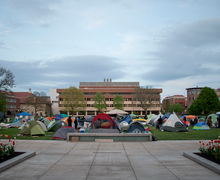Rodgers: Brown University student protests prove millennial ‘slacktivist’ label incorrect
Recent student protests at Brown University have proven that millennials are anything but “slacktivists.”
New York City Police Commissioner Raymond Kelly was scheduled to speak at Brown in Providence, R.I., on Oct. 29. University officials expected some protest from students, as Kelly is one of the figures standing behind New York City’s highly controversial stop-and-frisk policies, which disproportionately and routinely target minorities.
Kelly was going to deliver a speech titled “Proactive Policing in America’s Biggest City,” followed by a Q-and-A portion. However, Kelly was not able to proceed: University officials canceled the appearance after student protests prevented him from continuing.
A part of me wonders how the conversation would have gone if Kelly had been able to continue. Then again, I already know what the exchange would have been like: Kelly would have taken the stage and answered a few questions about the stop-and-frisk policies in the city. A few people would supportively cheer and snap for the students opposing the policies. Then Kelly would leave.
And everything would stay the same.
I understand, appreciate and cherish the value of free speech in our nation. It’s essential to our society.
But imagine if the students at Brown had done nothing and allowed last Tuesday’s events to occur as planned – notions about members of Generation Y being lazy, self-centered and without passion or commitment would have only been reinforced.
The stand made by Brown students rejects misconceptions that millennials are a bunch of “slacktivists,” or a group of passive, feel-good protestors.
Justice Gaines, a sophomore at Brown, was a part of the group at the lecture Tuesday that took a stand. He said that when students were first made aware of the decision to host Kelly at the university, there was a great deal of outrage, which led to the student protests.
Gaines explained that Brown students and members of the Providence community were very clear on the goals of their protest and that their actions were necessary. He added that 500 students signed a petition to keep Kelly away.
“It’s not that we didn’t want to debate him,” Gaines said when he described the cancellation of the lecture. “This was a protest against systematic racism. It’s not about free speech. It’s about fighting very dangerous policies. It’s about allowing the voices who are often silenced to be heard.”
The protest was more than just a moment for Brown students. Gaines declared that Tuesday’s events were also about joining in solidarity with the Providence community since the event was also open to the public. Gaines said students “wanted to stand with them.”
Similar to the culture and scenario in other college towns – including here in Syracuse at one point, and arguably still – a wedge has been driven between students and residents.
With last Tuesday’s protest, the gap in Providence was finally bridged.
As students of Syracuse University, we have to begin questioning what effects we can make on our campus. Whether it’s ensuring student voices are heard amid the chancellor’s transition, being intertwined with the city of Syracuse or creating equality on campus for all students, there is always something to lobby for.
On the SU campus, and within all of Generation Y, there is no room for “slacktivists.”
When it comes to the message the protest at Brown sent to other students, Gaines said he believes more college students should take action on their own campuses and “get out and do something.”
“We’re known as the generation that’s online and does nothing,” he said. “Take back your university.”
Nina Rodgers is a sophomore sociology major. Her column appears weekly. She can be reached at [email protected].
Published on November 5, 2013 at 1:51 am




